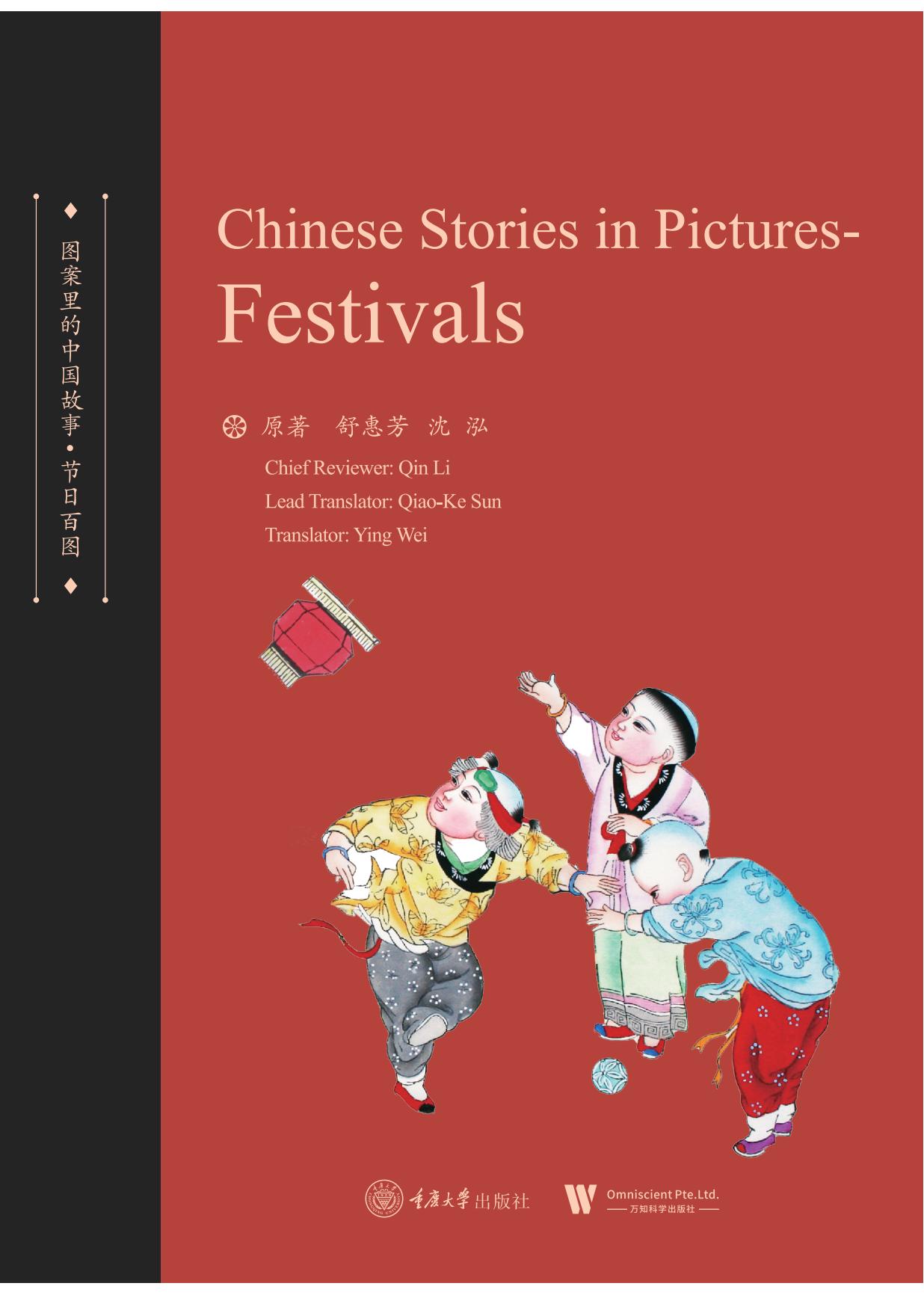
Chinese traditional festivals are the significant days claimed, modulated, established, and carried down by Chinese ancestors to adapt to various needs of life and production, as well as to commemorate certain individuals or events. Major Chinese traditional festivals include the Spring Festival, Lantern Festival, Qingming Festival, Dragon Boat Festival, Qixi Festival, Mid-Autumn Festival, and Chong Yang Festival. These traditional festivals are diverse in form and rich in content, catering to basic human needs, such as existence needs, mind tranquillity, and physical health. Apart from satisfying basic needs in life, these traditional festivals also play a unique cultural role in maintaining the normal social order. Chinese traditional festivals can be traced to the long history of the Chinese nation, thus constituting a valuable spiritual and cultural heritage of the Chinese people.
The customs associated with these traditional festivals are rich and varied, and their cultural connotations can be summarized in the following aspects. First, these festival customs elevate and enrich folkloric practices, epitomizing many of the essences of Chinese folk culture. Second, they reflect and satisfy people’s spiritual needs. Third, they weave and strengthen the ties of interpersonal relationships, serving as a lubricant for social interaction and emotional exchanges. Fourth, they construct platforms for spiritual and physical revelry, providing people with spaces for unreserved psychological catharsis and free emotional expression. Fifth, they create fresh momentum for a world outlook that emphasizes the integration and inherent relationship between heaven, earth, and man, thus offering fertile ground for folk religious worship and beliefs. Sixth, they provide opportunities for leisure and entertainment. According to the “Views on the Implementation of the Project of Inheriting and Developing Traditional Chinese Culture”, issued by the General Office of the Central Committee of the Communist Party of China and the General Office of the State Council, further progress will be made in the revitalization project for Chinese traditional festivals and “Our Festivals” themed activities, to enrich the cultural connotations of traditional Chinese festivals and encourage new festive customs. Chinese traditional festivals constitute unique Chinese folk culture. Although the original colour of some festivals has been toned down in modern society, we can still perceive their vibrant festive culture through the traditional pictures handed down from generation to generation. This book selects Chinese traditional pictures used for festive celebrations in the old days and re-creation works by contemporary artists based on these traditional pictures to showcase the scenes of major Chinese traditional festivals. These pictures not only embody the festive mood but also carry the connotations of Chinese folk culture. Centred on each festival picture, the book tells the origins, interesting stories, customs, as well as myths and legends associated with these festivals. From these pictures, motifs, and symbols, we can still glimpse the festive carnival in old times and feel people’s leisurely and peaceful mindset.
Shen Hong
Winter 2021
Qin Li, the professor and doctoral supervisor at the School of Translation Studies, Xi’an International Studies University. She has been a visiting scholar at the Faculty of English, University of Cambridge, a book reviewer for Taylor & Francis, and is selected for the 7th batch of the “Hundred Talents Program” for young scholars in Shaanxi Province. She is also recognized as a talent under the “Six Batches” initiative of the Shaanxi Provincial Propaganda and Ideological Cultural System. Her research interests include translation theory and practice, translation history, and comparative literature translation studies. She has published four monographs, including Research on the Chinese Translation of Foreign Popular Literature in the New Century, The Interplay between Chinese Translated Literature and Native Literature, and A Study on the Translation History of Chinese Science Fiction Literature in the Past Century and so on. Li Qin has published seven academic translations, including works such as Mythology and Philosophy from Pre-Socratic to Plato and Mythology Library Babylon and Assyrian Mythology, both part of the “Mythology Library” under the “13th Five-Year Plan” National Key Books Publishing Plan and National Publishing Fund Project, as well as Annual Report on Culture of Shaanxi (2018)in the Shaanxi Blue Book series, and The Development Trajectory of Eastern Societies and the Theories and Practices of Socialism in the “China National Governance Series” under the China Book International Promotion Plan and the Commercial Press–Routledge Foreign Translation Project. Qin Li has led three National Social Science Fund projects, several Ministry of Education Humanities and Social Sciences research projects, and provincial and ministerial projects supported by the Shaanxi Provincial Social Science Fund. She has collaborated on three horizontal projects with the Commercial Press and China Social Sciences Press. Many of her research achievements have received awards from the Shaanxi Provincial Government.
Qiao-Ke Sun, MA in Linguistics of University College London (UCL), UK; PhD in Translation Studies at Xi’an International Studies University (XISU), China; certified cultural and educational expert by the Foreign Talent Research Center of the Ministry of Human Resources and Social Security of the People’s Republic of China, official member of the Chartered Institute of Linguists (CIOL), professional member of the Translators Association of China (TAC), academic member of the Globalization and Localization Association (GALA), and holder of the CATTI Level 2 Translation Certificate. Currently, she works as the lecturer at the School of Foreign Languages, Wenzhou University of Technology. Her research interest is the translation and dissemination of Chinese culture. She has participated in multiple projects including the National Social Science Fund of China, the Chinese Academic Translation Project, the Chinese Books Promotion Plan, and the Twelfth Five-Year Plan for Translation of National Key Books Publishing Project. She has published the monograph: Study on Translation Theory and Practice Between English and Chinese and the academic translated works: The Contemporary Rural Literature of Shaanxi: A Modernity View and Study on Strategies of College Students’ Entrepreneurial Skill Development. Her main translation project partners include the United Nations, Tencent, Baidu Wenxue, China Council for the Promotion of International Trade, Chinese Academy of Social Sciences, Zhejiang University, Omniscient Pte. Ltd., Russian Academy of Sciences Science Publishing Group etc.